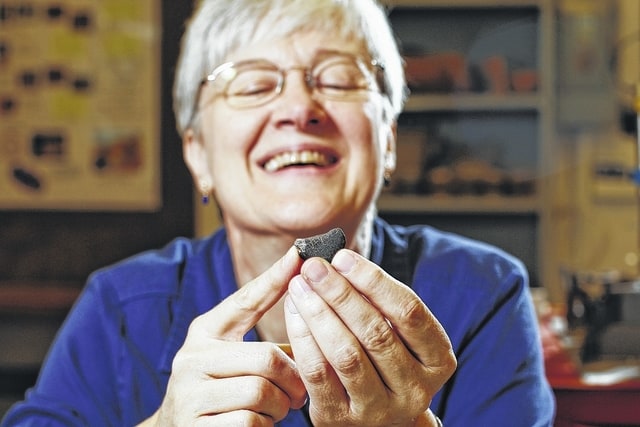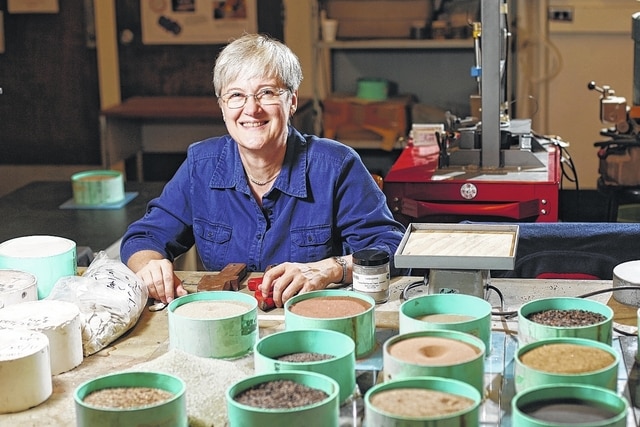

GOLDEN, Colo. – A Champaign County native is spending the next several months researching how to harvest water in asteroids for use in space missions.
Dr. Leslie Gertsch is a 1975 West Liberty-Salem High School graduate and associate professor of geological engineering at the Missouri University of Science and Technology. She received her bachelor’s degree from the Colorado School of Mines and received her doctorate in 1989. She worked for the U.S. Bureau of Mines and taught at several places. She now teaches mostly geological engineering and mining, particularly space mining.
Gertsch is researching how much water in some types of asteroids can be extracted in an “industrially reasonable” process for use. She is working in Colorado while on a yearlong sabbatical as part of a two-year research project sponsored by the National Aeronautics and Space Administration (NASA).
“Reasonable” translates to doable and not expensive, Gertsch said.
As part of this research project, Gertsch and her team are attempting to determine the feasibility of using water from asteroids in space as fuel and propellants.
“It’s not so much rocks or metals. Not yet. Those will be important later,” she said. “The first things we need to produce in space is spacecraft fuel and propellants, so we can move through space.”
Gertsch said right now space missions are launched from Earth, which uses up a lot of energy to get out of Earth’s gravity and atmosphere. Using up that energy limits how far a spacecraft can travel. By finding a way to use resources in space, trips can be extended or chart new territory.
“If we can produce fuel or propellants out there, we wouldn’t have to launch from Earth,” she said, adding space gas stations could be a future development.
The laboratory Gertsch is working in has a vacuum chamber built for the Apollo program. It has been used by many universities and researchers since then.
Gertsch became attracted to geology and mining at a young age.
“When I was in grade school, even earlier, I was always interested in picking up pretty colored rocks,” she said. She went to college studying engineering, more specifically rock engineering, which drew her to the Colorado School of Mines.
As time passed, she also became interested in space, and she felt combining her mining engineering and geological engineering expertise to space exploration would be a good fit. Gertsch said most people think space is the province of astronauts and aerospace, but engineering and mining are needed as well.
More than digging a hole
Mining is more than digging a hole, Gertsch added.
“It’s like farming in many ways,” she said. “You are using natural resources in as sustainable and cost-efficient manner as possible.”
Gertsch said the group of researchers is still refining equipment to determine what will work in space.
“The most difficult part is selecting materials to test in place of actual pieces of asteroids,” she said. “Mostly because meteorites – pieces of asteroids – are very expensive. It’s more than we can afford on a research project budget.”
Part of that is figuring out what is a similar material to simulate what is found in meteorites.
Space is an exciting option for future development and exploration, she said.
“My aerospace friends say we could reinvent mining,” she said. “What we’re trying to do is use what we know, from millenia of experience, and do what we can on Earth to adapt or start developing mining methods to use on space, whether on a planet like Mars or in the vacuum of space around asteroids.”
Gertsch said there are approximately two or three dozen methods to mine on Earth, and some will have to be adapted to an outer space environment, where there’s no atmosphere or little to no gravity.”
“Earth has always had gravity and a flattish surface. Neither one will be true in space,” she said.
Over the past few years a number of private companies have formed, to consider mining in space. Gertsch said she finds that encouraging, but said she does not have an idea on how long it may take for those ventures to start producing something tangible.
NASA is the “main source of research for doing things in space, including mining, but it’s not the only one,” she said. “As time goes on, private companies will become more able to support research in that regard. Right now, a lot of work can be done to develop potential mining methods for different commodities in space. Even though we’re concentrating on water and other volatile materials now, there will come a time when iron and others are needed in mining in space.”
And this research is needed, as resources on Earth become more scarce, Gertsch said.
“I think, as long as we humans live only on a single planet … sooner or later this planet will be hard put to support all of us,” Gertsch said. “One way of lightening our footprint on this planet and increasing the odds of long-term survival of humanity in general, is to function permanently and sustainably outside of Earth.
“There’s a lot of real estate out there, many hundreds of thousands of times more real estate than on Earth,” she added. “In the long term, we’ve got to expand beyond a single planet. The way to make that happen most effectively and sustainably is to plan resource utilization as much as we can from what we already know.”



